Boryspil
Boryspil (Ukrainian: Бориспіль, translit. Boryspil’, Russian: Борисполь; also referred to as Borispol) is a city of regional significance located in the Kyiv Oblast (region) in northern (central) Ukraine. Administratively, it is incorporated as a city of regional significance. It also serves as the administrative center of Boryspil Raion (district), though it administratively does not belong to the raion. Its population was estimated as 63,169 (2020 est.)[1]
Boryspil
Бориспіль | |
|---|---|
City | |
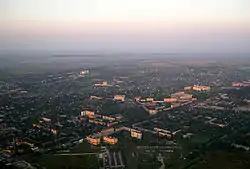 Aerial view of Boryspil | |
 Flag 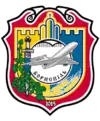 Coat of arms | |
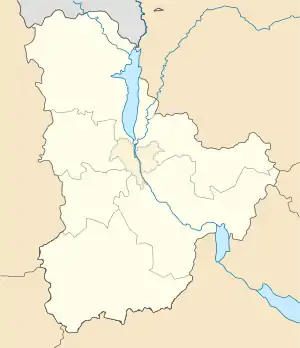 Boryspil Boryspil within Ukraine 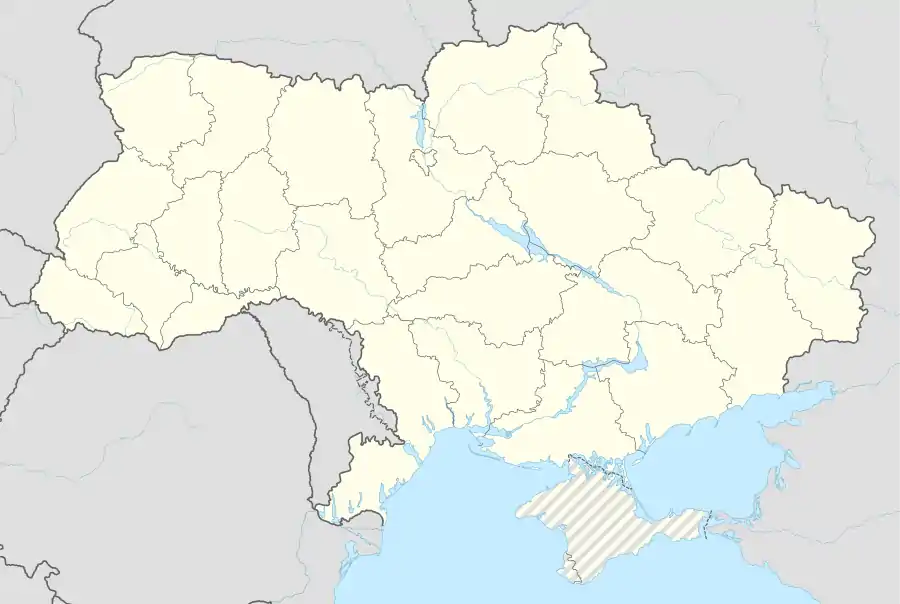 Boryspil Boryspil (Ukraine) | |
| Coordinates: 50°21′N 30°57′E | |
| Country | |
| Oblast | |
| First mentioned | 1015 |
| Area | |
| • Total | 37.01 km2 (14.29 sq mi) |
| Population (2020) | |
| • Total | 63,169 |
| Area code(s) | +380 4595 |
| Website | http://www.boryspil.osp-ua.info/ |
Name
Official sources state that the city derives its name from Prince Boris, of Boris and Gleb, two sons of Vladimir the Great, who were both murdered during the internecine wars of 1015–1019.[2] According to Petro Tronko in his History of cities and villages in Ukrainian SSR, the locality where Boryspil is located was named as "Borysove pole" (Borys's field) when in 1015 a son of Vladimir the Great Borys returning from another raid against Pechenegs died from hands of hired assassins.[3] Others state that the name of the city is of the Greek origin; it consists of two parts Borys from Borysthenes (the Greek name for Dnieper) and Pil from Polis (the Ukrainized version of the Greek word). The city also has a sister city, Hopkins, Minnesota, US.[4]
History
The settlement is first mentioned in 1015 in connection with the internecine wars of 1015–1019,[5] and later, in the 12th century, as part of the Kyivan Rus (Ruthenia). Sometime after the Mongol invasion, most of the Ruthenian territory belonged to the Grand Duchy of Lithuania. The site of the settlement belonged to the King's translator Soltan Albiyevich who in 1508 sold it to the Kyiv Saint Nicholas Hermitage. It is believed that it was then when the settlement received its modern name.
After the Union of Lublin, the southern regions of the Grand Duchy of Lithuania were passed over to the Polish Crown and in 1590 on decision of the Sejm of the Polish–Lithuanian Commonwealth, the settlement was given to Wojtech Czonowicki, a senior of the Registered Cossacks, who later participated in the Kosiński uprising. In 1596 the Polish King Sigismund III Vasa transformed the town into a royal estate and there was formed the Boryspol starostwo. Later the same year it was granted the Magdeburg rights (or possibly Lübeck law) and in the town was built a ratusz. The Boryspil town's coat of arms contained an image of Saint Stanislav (see Stanislaus of Szczepanów). With extinguishing the Nalyvaiko Uprising, the Boryspil starostwo was passed to Stanisław Żółkiewski and stayed as the Żółkiewski's family estate until the 1648 Khmelnytsky Uprising.
On 14 January 1752 the Hetman of Little Russia Kyrylo Rozumovsky has given the town in eternal possession to his brother-in-law Kyiv Colonel Yukhym Darahan.
On 2 June 1920 at the Battle of Boryspil Polish-Ukrainian Army defeated the Red Army.
Later in 1920 in the town was established the Soviet regime. There were created four collective farms (kolhoz): "Shevchenko Memorial", "Kirov Memorial", "Sickle and Mallet", "Victory".
The town suffered greatly during the Soviet organized Holodomor when between 1 January 1933 to 1 January 1934 only by official data perished 5,739 among which 266 were infants (less than a year old).
During World War II, Boryspil was occupied by the German Army from September 23, 1941 to September 23, 1943. Fierce battles were fought around the city during its capture and liberation. During the Nazi occupation, the airfield of the modern Boryspil International Airport was used as a camp for prisoners of war.
In 1956 Boryspil was officially granted the city status. Currently the city is home to the country's main and biggest airport, Boryspil International Airport (international code KBP) and some minor industry.
Infrastructure
Aerosvit Airlines had its head office on the grounds of Boryspil International Airport.
Around the city detours the main European route ![]() E40, particularly the Kyiv–Kharkiv highway (part of the national
E40, particularly the Kyiv–Kharkiv highway (part of the national ![]() M03 route). Along
M03 route). Along ![]() M03 between Kyiv and Boryspil International Airport stretches a modernized motorway.
M03 between Kyiv and Boryspil International Airport stretches a modernized motorway.
In the city also starts another national highway ![]() H08 which connects Boryspil with Zaporizhia.
H08 which connects Boryspil with Zaporizhia.
Sports
It also hosts Ukrainian Premier League team Arsenal Kyiv at the Kolos Stadium.
Press
- "Trudova Slava" newspaper (since 1930)
- "Visti" newspaper (since 2000)
Notable people
People born in Boryspil
- Pavlo Chubynsky (1839–1884), author of the Ukrainian National Anthem
Gallery
 Entrance to Boryspil from Kyiv-Boryspil motorway
Entrance to Boryspil from Kyiv-Boryspil motorway A street intersection in downtown Boryspil
A street intersection in downtown Boryspil A multi-storey apartment block in Boryspil
A multi-storey apartment block in Boryspil Boryspil Airport
Boryspil Airport Boryspil Airport, Terminal F
Boryspil Airport, Terminal F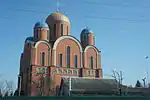 A church in Boryspil
A church in Boryspil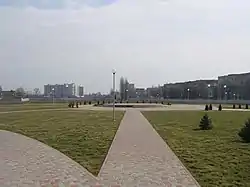 A park in Boryspil
A park in Boryspil Old school building
Old school building
See also
- Battle of Boryspil (1920)
References
- "Чисельність наявного населення України (Actual population of Ukraine)" (PDF) (in Ukrainian). State Statistics Service of Ukraine. Retrieved 30 September 2020.
- "Бориспіль - сайт міста :: Історія міста Бориспіль". Archived from the original on 2019-12-08. Retrieved 2018-02-13.
- Petro Tronko. Бориспіль. History of cities and villages in Ukrainian SSR.
- "City of Hopkins, Minnesota: Sister City: Boryspil, Ukraine". Hopkinsmn.com. 2011-09-27. Archived from the original on 2015-11-21. Retrieved 2015-11-20.
- "Бориспіль - сайт міста :: Історія міста Бориспіль". Archived from the original on 2019-12-08. Retrieved 2018-02-13.
External links
- "Visti" newspaper website (in Ukrainian)